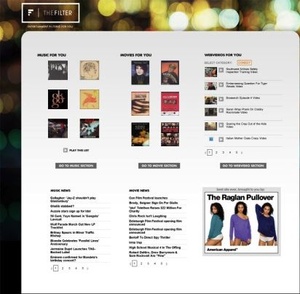 It’s hard to fault Peter Gabriel’s logic: We are overwhelmed by the amount of information and choice we have on the Web. But is his solution — a recommendation engine called The Filter — really the answer?
It’s hard to fault Peter Gabriel’s logic: We are overwhelmed by the amount of information and choice we have on the Web. But is his solution — a recommendation engine called The Filter — really the answer?
Of course Gabriel, the genius behind the British rock band Genesis and the solo artist who gave us such tunes as “Solsbury Hill,” “Exposure,” and “Games Without Frontiers,” thinks so as he and England’s Eden Ventures have invested $8 million in The Filter. They believe people are overwhelmed by the Web and can’t find good content because it’s buried out of sight.
“When you drown people in an ocean of information, you’ve got to give them navigation tools,” Gabriel told News.com. “I know that there is better stuff out there than what I generally am exposed to . . . So if I have a sort of intelligent ally working with me 24 hours a day, I think I have a much better chance of getting stuff that will entertain, excite, and inspire me.”
The Filter, originally launched as a music recommendation service about a year ago in Europe, re-launched today in private beta as a more complete solution. It will be available to the public sometime in May.
But there’s something about The Filter that bugs me. What separates The Filter from any of the other algorithm-based recommendation engines out there, whether a human is a part of the process or not — Amazon, iTunes, lastFM, Netflix, Imeem, Digg, Pandora, and many more?
 Founders say The Filter’s recommendation engine is more sophisticated than competitors because it doesn’t rely on the ratings that people have assigned to songs, albums, movies, or books. It determines user recommendations by observing what they do with these on the Internet.
Founders say The Filter’s recommendation engine is more sophisticated than competitors because it doesn’t rely on the ratings that people have assigned to songs, albums, movies, or books. It determines user recommendations by observing what they do with these on the Internet.
To get the full power of The Filter, users can download its software to their desktop, where it watches and digests various streams of Internet behavior — what you buy at iTunes, what songs you sample at MySpace, what video you stream, your browsing history, to name a few. To use The Filter, however, you don’t have to rely on the desktop client.
Users also can connect with friends and track their media-consuming behavior.
The Filter takes this learned behavior, mixes in its algorithms, and generates highly targeted and personalized recommendations for not only what they think you might like but also what you are in the mood for at a particular time.
I don’t know at any given moment if I will stick with what’s playing now — Melody Gardot’s “Worrisome Heart” — or if I will switch to Modest Mouse, Miles Davis, or Phronesis in the next five minutes, so how will The Filter know?
But I digress.
 A compelling alternative to algorithm-based recommendation engines is people-powered search, something that entrepreneur Jason Calacanis is shouting about from the rooftops with his human-powered search engine, Mahalo.
A compelling alternative to algorithm-based recommendation engines is people-powered search, something that entrepreneur Jason Calacanis is shouting about from the rooftops with his human-powered search engine, Mahalo.
Both algorithm and people-power introduce bias — the ones who wrote wrote the algorithm (in this case for The Filter) or the actual humans hired by Calacanis to generate Mahalo content. In both cases, I don’t necessarily distrust the brainiacs or the folks dedicated to bringing me the absolute best the Web has to offer on Ambre Lake, the winner of “Rock of Love 2.” But I don’t know these people, either.
Who I do know are those in my Social Information Network. Family. Friends. Friendly strangers. Co-workers. The dude who runs the local coffee shop. Even friends of my 13-year-old kid.
Lately, I’ve added my extended social network of Facebook and Twitter into my SIN. I may not know @amyguth, @thebuffster, or @Bwana personally, but I do have a better sense of them, their likes and dislikes, than I do anonymous algorithm writers because I choose to let them into my life by following their lives.
So when it comes to The Filter, it’s just another service, another tool, another data point that I can check in on and see what’s there. I’ve found great music on Pandora and lastFM. And, once I either get my invite or the public floodgates open, I expect to find some cool stuff through The Filter.
 But aren’t all these recommendation services — there’s so many of them out there these days — just adding to the noise, albeit in a different manner?
But aren’t all these recommendation services — there’s so many of them out there these days — just adding to the noise, albeit in a different manner?
I mostly find great information and content through my personal social information network, through people like @therefore, @academicdave, @nicholasspencer, and @stevegillmor on Twitter. I suspect you do, too.
In fact, it’s time to check out M83. Thanks @nicholasspencer.
Additional coverage: Fortune, New York Times, and Silicon Alley Insider.
